- Home
- Jim Eldridge
Codename Céline Page 2
Codename Céline Read online
Page 2
“William!” she called.
Immediately, a man appeared from an inner doorway. Like the man in the dark suit on guard at the main door, he was large and very muscular, and I was sure I spotted the outline of a gun bulging through his jacket, just below his armpit.
“Take Miss Debuchy to Mr Swinton’s office.”
The large man nodded and gestured for me to follow him.
Two large men, both big enough to fit nicely into a rugby scrum, and one of them possibly armed with a gun. What sort of ‘research’ went on at this ‘Inter-Services Research Bureau’ I wondered.
The big man led me through a series of doors, and then down two flights of concrete stairs to a basement corridor. We passed along the corridor. All the doors in the corridor were shut and there seemed to be very little noise coming from behind any of them. Finally, we reached a door with the number ‘7’ on it. The big man knocked at it, and when a man’s voice from inside called: “Enter!”, he opened the door.
“Violet Debuchy, Mr Swinton,” he announced, and stood aside to let me enter, then pulled shut the door behind him and left.
Edward Swinton stood up as I walked towards his desk. He was a small, very thin man in his forties, I guessed. Clean-shaven, his hair short and dark but turning grey. His clothing was very neat: a dark suit and what looked like a regimental tie. It struck me that he was a military type.
“Thank you so much for coming,” he said, his voice sad. “I can only repeat my condolences at your dreadful loss.” He gestured at the chair opposite him. “Please, do sit down.”
“Thank you,” I said.
I sat, and as he sat down, I said: “Your note said you knew my father.”
“Yes,” nodded Swinton.
“How?” I asked.
Swinton hesitated, his eyes searching my face as if looking for something. Then he said: “I’ll come straight to the point, Violet. You don’t mind if I call you, Violet, do you?”
“No,” I said. “Violet is fine.”
“As I said in my note, I worked closely with your father. He was a wonderful man.”
“Yes,” I nodded. “He was.” I frowned and looked at Swinton quizzically. “When you say you worked with him, what does that mean, exactly?”
“A good question,” nodded Swinton. “But before I answer, I must ask for your promise that nothing that passes between us will be repeated by you outside this office. Not even to your aunt, and certainly not to any of your friends.”
“I promise,” I said.
“Thank you,” said Swinton.
I smiled. It was the first smile I’d been able to raise since I’d got the letter, but it wasn’t a real smile – more of a suspicious smile.
“You take my word very easily,” I pointed out to him. “Do you believe it every time someone says they promise?”
“Your father told me that if you gave your word, you meant it,” said Swinton. “He said that you were absolutely to be trusted.”
As Swinton said these words, I could feel tears pricking at the back of my eyes at the thought of Dad talking about me in that way. Don’t cry, I warned myself. Dad wouldn’t have wanted that.
“He was very proud of your achievements at school, both academically and particularly in sports,” Swinton continued. “He said you were the bravest person he knew. He was particularly proud of you scoring the winning goal in a game of hockey for your school, even though you’d broken your arm a moment before.”
“It wasn’t actually broken,” I corrected him. “Just chipped a little.”
“He also said you could keep a secret like no one else. And what I’m about to tell you is a very big secret. If you don’t feel you can keep it, then we’ll just end this meeting very politely and you can go on your way.”
Oh no we won’t, I thought fiercely. This man knows something special about Dad, and I’m determined to find out what it is.
“I’ve already given you my word,” I said, finding it hard to keep the annoyance out of my voice.
Swinton smiled again.
“You’re very like your father, you know,” he said. “He was always straight to the point, and he didn’t suffer fools gladly, either.”
His friendly manner made me relax a little.
“I’m sorry,” I apologized. “I didn’t mean to suggest I thought you were a fool …”
And I could tell he wasn’t.
“Then let’s get to it,” he said. “Your father was a key part of SOE – the Special Operations Executive – which was set up by our Prime Minister Winston Churchill to fight the Nazis behind enemy lines.”
“I knew he was fighting in France with the Resistance.”
“Jacques was much more than that. He was a key organizer of the Resistance in northern France, and the liaison between the French Resistance and SOE’s London headquarters.” He smiled again. “Which is here, in this building.”
“The Inter-Services Research Bureau?” I queried.
Swinton shrugged.
“It’s a title that means nothing, and at the same time means exactly what it says: it brings together different services. In this case, spying, assassinations, explosives and saving lives.”
I said nothing, but let myself take it all in. Spying? Assassination?
“SOE has agents in various countries occupied by the enemy: Greece, France, Italy, Holland, even Germany itself. My job as Head of F Section is with France. We prefer to use agents who have a French connection, especially those who are half-French and bilingual, because they can pass as French much more easily than an English person pretending to be French, no matter how good their French is.”
“People like my father.”
“And like you. Which is why I invited you here. How would you feel about becoming an agent, operating behind enemy lines in France?”
I stared at him, stunned. Me? Actually physically fighting the Nazis in this war! What was it he’d said? Assassinations! Explosives!
Swinton must have seen my astonishment in my face. This couldn’t be happening! I was a girl, not long out of school.
“Before you say anything, I must warn you that it is very dangerous. Very dangerous indeed. There is a great risk of being captured by the Nazis, and the Gestapo are not gentle in their methods of extracting information, regardless of gender or age. A young woman is as at much risk as a young man, possibly more so …”
But I didn’t need to hear any more. This was the opportunity I’d been waiting for, but one I thought only happened in dreams. I was suddenly scared that Swinton might change his mind and decide that I was too young after all, so I blurted out: “Yes! I’ll do it!”
Swinton was studying me carefully.
“I am not exaggerating when I say it is dangerous. You could be killed. Unfortunately, the chances of that are very high …”
“I said yes and I meant it!” I told him firmly. “I’ve been desperate to do something for the war effort, but the only thing I’ve been offered as a woman is working in a shop! There are the services – Army and Navy – but again the women are kept away from the action, typing and passing messages around. This will be doing something real!”
And a chance to carry on Dad’s work, I promised myself.
“The reason I would caution you is that you are still very young…,” continued Swinton.
“In a few months I shall be eighteen,” I replied. “That’s the same age as the young men who are joining up to fight.”
Swinton nodded.
“Very well,” he said. “Welcome aboard! I’ll fix up your training – it’s very intensive, but absolutely vital. The lessons you learn during training will help to keep you alive when you’re out in the field.
“The important thing to stress again is absolute secrecy; officially, SOE does not exist. You will not be able to tell anyone about your work
or this organization, not even your closest friends or relatives.”
“Why?” I asked. “Aunt Abbey and I knew that Daddy was working behind enemy lines in France.”
“You knew that he was a member of the Resistance,” said Swinton. “You did not know that he was a member of SOE. Officially, SOE doesn’t exist.”
“Why?” I asked again.
He hesitated, then said: “Let’s just say it’s politics. Your official cover story will be that you have been offered a secretarial job with the Inter-Services Research Bureau, which co-ordinates paperwork. Your job will involve having to “go away to conferences to take notes”. That’ll be your cover story when you are away at training, and also when you’re on a mission.
“As I said, officially, SOE and its agents do not exist. All our agents are given new names, new identities for when they are active. If they are caught, their true identities are not to be revealed. While you are on active duty – which includes your period of training – you will be Céline LeBlanc. It’s not just a case of having new identity papers, you must become Céline LeBlanc. You will learn how during your training.” Swinton regarded Violet quizzically. “I am sure you have many questions you want to ask,” he said. “I would ask you to keep them until after your training, just in case you change your mind.”
“I won’t,” I said firmly.
“We shall see,” said Swinton. “The training can be quite … tough.”
“As my father said, I can be tough if needed,” I retorted.
“We shall see,” repeated Swinton. “There is a world
of difference between playing hockey at school with a chipped bone and the kind of training you are about to be subjected to.”
“I’ll be up to it,” I assured him. “But I do have one question: how did my father die?”
Swinton hesitated, then said: “He was captured by the Nazis and interrogated.”
“Do you know who carried out the interrogation?”
“A Gestapo officer called Maximillian Schnell.”
“The Gestapo?”
“Hitler’s Secret Police. But they’re not really that secret. They run everything in occupied France.”
“And Schnell killed my father?”
“During the course of the interrogation.”
I nodded.
“Thank you, Mr Swinton.”
“Maximillian Schnell is a very dangerous man, Miss LeBlanc. You’ll do your best to avoid coming into contact with him.”
I nodded, but inside I promised myself I would have my revenge on this Maximillian Schnell. I looked forward to the day I came face to face with him.
Chapter 3
“How did you get on?” asked Aunt Abbey when I returned home.
“They offered me a job,” I told her.
“A job?” said Abbey, surprised. “Doing what?”
“Secretarial work,” I replied.
“But you can’t type!”
“They’ll teach me,” I said. “But at first it’s doing stuff like filing, putting papers in order.”
Aunt Abbey frowned, uncertain.
“This has come a bit out of the blue,” she asked suspiciously. “Who are they, this Inter-Services Research Bureau?”
“Oh, they’re all very proper and above board,” I assured her. “It’s a Government Department responsible for keeping records. Not important ones, just the Accounts records of different departments, and things like that.”
“But why did they offer it to you?”
I hesitated, and then decided that a part-truth was always more convincing than an out-and-out lie, which could be checked on and found to be a fraud.
“The man who put the note in the envelope telling us about Daddy, he turned out to be an old friend of his,” I said. “I think he was feeling sorry for me and wanted to do something to help.”
“I thought that letter came from the War Office,” frowned Abbey suspiciously.
“They sent it on,” I said, thinking quickly. “That’s one of the things they do, this Inter-Services Research Bureau; they distribute post for different Government Departments. This man recognized Daddy’s name in the official letter and put in a note of his own when he sent it out.”
This explanation seemed to convince Aunt Abbey.
“Well that’s a good thing,” she said. “A job in an office will be much better for you than working in a munitions factory, or joining the Land Army. Much safer.”
Secretly I thought: if only you knew!
“Yes,” I said. “That’s what I thought. He said I’d have to go away now and then.”
“Why?”
“Well, to start with I have to be trained. So they’re sending me on a residential course.”
“For filing?”
“That, and also teaching me things like shorthand and typing.”
“Surely you could go to a local college to learn those.”
“Yes, but they like to do things their way.” I gave her a smile. “It is the Civil Service, after all.”
“Yes, I suppose so,” said Abbey reluctantly. “I’ll
miss you.”
“I’m sure I’ll be allowed time off to come home,” I said, although I wasn’t sure. Mr Swinton had talked to me for a long time, giving me more details and answering my questions, but I still wasn’t certain what exactly lay in store for me.
……………………………..
It was two days later that a brown envelope arrived for me. Inside was a letter addressed to Céline LeBlanc instructing Céline to report to Cranleigh railway station in Surrey the following Tuesday.
“Please bring changes of clothing and toiletries for a stay of four days,” the letter continued. “A railway ticket to Cranleigh station is enclosed. Make sure you catch the train that arrives in Cranleigh at 9.30am. A bus will be waiting to take you to your destination. The bus will have a card in its window saying ‘Research Office’.
The following Tuesday I said goodbye to Aunt Abbey and caught the train to Cranleigh. The train was crowded, but I was lucky enough to get a seat. I was one of ten girls and women who got off at Cranleigh, all of us carrying luggage bags. Remembering Mr Swinton’s firm instructions not to talk to anyone about SOE, or anything to do with it, I didn’t exchange any words with the other girls, even though I guessed we were all quite likely there for the same reason. This was confirmed when every one of us headed for the cream single-decker bus that was waiting outside the station, each of us checking that it had a card with the words ‘Research Office’ in the window.
The driver stood outside, watching us, and seemed to be counting us as we got on the bus. When the last of us was on board, he climbed into the driving seat and switched on the engine.
I looked at the others. Three were about my age, late teenagers. Four looked to be in their twenties, and two were older, in their thirties. So far none of us had spoken, but once we set off the girl in the seat in front of me, who looked about seventeen, turned round and whispered excitedly to me: “I know we’re not supposed to say anything, but isn’t this exciting!”
I wanted to say “Yes”, because it was, more exciting than anything I’d ever done before, but I was worried it might be a trap of some sort to see how loose-tongued I was. So instead I just whispered back: “You’re right. I don’t think we’re supposed to say anything.”
At this, she looked unhappy.
“But if we don’t say anything, how will we know what we’re supposed to be doing?”
“I’m sure we’ll be told,” I said.
I turned to look out of the window at the countryside as we passed, and also to avoid getting involved in any further conversations.
The bus climbed up and up, and I realized we were in the Surrey hills. The countryside around was green and beautiful, especially after the drabness of bom
b-torn London. We travelled along a country road, then turned in at a wide gateway that had the name “Winterfold House” beside it, and continued along a winding drive. Through the trees and ornate rhododendron bushes I could see a large house emerging. No, more than a large house, it was a mansion.
“Wow!” breathed the girl in front of me in awed tones. “It’s a stately home!”
As we rolled along the final stretch of the drive and pulled up outside it, I had to agree with her. It was a stately home, and I half expected a Duke and Duchess with lots of footmen and servants waiting outside to greet us, like in the films.
“All off!” called the driver.
We gathered up our bags and climbed down from the coach. A stern-faced woman was standing in the wide doorway of the house, at the top of a set of steps. She was holding a clipboard with a few sheets of paper on it. As we climbed the steps she gestured for us to go inside, with a terse: “Wait in the lobby.”
The lobby, the reception hall, was like nothing I’d ever seen before in my life. If the outside was impressive, the reception area was awe-inspiring. There was ornate plasterwork on the cornices and ceilings, beautiful pastel shades of paint on the woodwork, exquisite Oriental-style wallpaper, and the walls hung with enormous portraits of people who were obviously very important and very rich, the paintings clearly stretching back a long way from the different fashions of costumes they wore.
As the ten of us newcomers gathered, I was aware of another ten women coming into the lobby from an interior door. Again, like our group, they were of mixed ages: some young, some older.
The woman with the clipboard came into the lobby and pulled the door shut.
“Welcome to Winterfold House,” she said, her tone clipped. “It has been taken over for the war effort. The owners are still here, occupying a cottage in the grounds. Remember that we are their guests and while you are here you will be expected to treat this house, and the grounds, with respect.
“My name is Miss Penton and I will be your course leader. These girls …” and she indicated the ten who’d just come from somewhere within the house, “are on the same course, but ahead of you. They’re going to act as your guides for the first couple of days. You will each be allocated a room to share with one of them. They’ll help you with any questions you may have. After you’ve been shown your room, leave your belongings there and come to Room 6, where we’ll begin.” She consulted the sheets of paper on her clipboard. “Josephine Barge!”

 Murder at the Ritz
Murder at the Ritz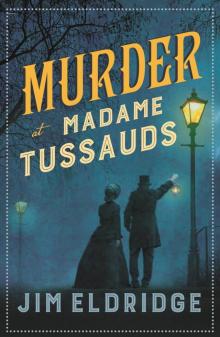 Murder at Madame Tussauds
Murder at Madame Tussauds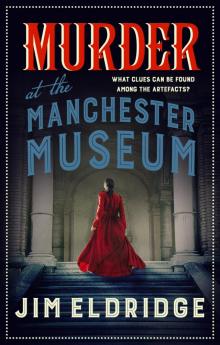 Murder at the Manchester Museum
Murder at the Manchester Museum Blood On the Wall
Blood On the Wall 4.3.2.1
4.3.2.1 Jungle Kill (Black Ops)
Jungle Kill (Black Ops) Murder at the Natural History Museum
Murder at the Natural History Museum Murder at the British Museum
Murder at the British Museum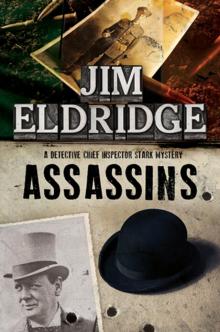 Assassins
Assassins Hunk and Thud
Hunk and Thud Roman Invasion
Roman Invasion Big Rock and the Masked Avenger
Big Rock and the Masked Avenger The Last Enemy
The Last Enemy Urban Assassin
Urban Assassin The Deadly Game
The Deadly Game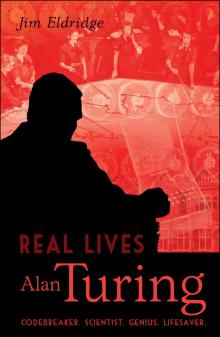 Alan Turing
Alan Turing The Lethal Target
The Lethal Target The Giant Rumble
The Giant Rumble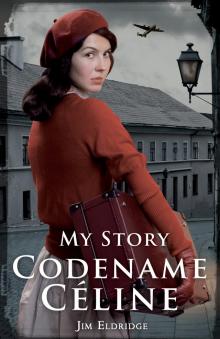 Codename Céline
Codename Céline Death in the Desert
Death in the Desert Escape from Pompeii
Escape from Pompeii The Invisible Assassin
The Invisible Assassin Shadows of the Dead
Shadows of the Dead Jack Versus Veto
Jack Versus Veto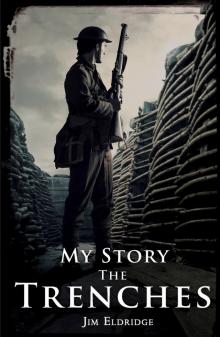 The Trenches
The Trenches Murder at the Fitzwilliam
Murder at the Fitzwilliam Coming Home
Coming Home